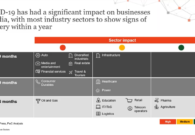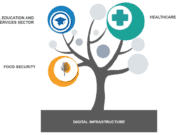Webinar: Examining a post COVID-19 UK Economy
On 22 July, the UK India Business Council was very pleased to welcome industry specialists to examine what a post COVID-19 UK Economy will look like.
UKIBC Director Chris Heyes chaired the discussion led by Henk Potts, Director of Investment Strategy at Barclays Private Bank; Sunil Patel, Partner, Chief Operating Officer, Technology & Investments and Chairman of the UK-India Group at PwC UK; and Samantha Mobley, Partner in the EU, Competition & Trade Practice of Baker McKenzie.
Henk began the conversation by exploring global growth forecasts around the 2018-2021 financial years. He then explained how COVID-19 has affected the UK consumer and growth. Although inflation and unemployment rates have increased, there are still reasons to be optimistic. After its lowest point in April, the economy is rebounding, and 2021 should be supported by significant fiscal stimulus and monetary easing. Henk added growth is forecasted at 5.8% for 2021 with inflation rising to 1.6%.
Henk went on to analyse the Bank of England’s (BOE) package response to COVID-19 and the measures it has taken. He touched on the Bank Rates and said we will see this remaining at 0.1% in 2020 and 2021. Henk also added the BOE May forecasts predict consumer spending to fall by 30% in Q2 and unemployment rising to 9%, before recovering to pre-crisis lows in 2022.
Finally, Henk discussed the Chancellor’s role in easing fiscal policy with loan guarantees to businesses and furlough schemes to help prevent unemployment claims. He elaborated with the rise of national debt and the nearing end of the furlough period. Henk concluded, ultimately, the impact of stimulus will be highly dependent on whether households and firms have the confidence to spend and the avoidance of a damaging second wave of infections.
Sunil addressed COVID-19’s impact on sectors in the UK, with accommodation and food service activities seeing the most substantial impact at 92% change from February to April.
There are three common themes that have risen across sectors. The first is securing the workplace and workforce. More specifically, employers deciding if they can bring employees back to work, employees’ levels of productivity, and resuming operations securely and safely. The second is the use of automation and technology. The new norm will be driving technology into business models. The third and final is the acceleration of transformation, meaning all businesses looking at how to transform appropriately.
Sunil further delved into the UK’s three most affected sectors: travel and leisure, transport, and retail. For each of the sectors, Sunil answered the questions, ‘Where are we today?’ ‘What are we learning?’ and ‘How do we respond?’
Samantha focussed on four main topics: what has happened to M&A, the future outlook for deal making, whether merger control still exists, and whether FDI is still welcome. She noted 2020 will follow a similar pattern to 2019 regarding the geo-political impact on deal making, and she drew comparisons between global and UK M&A volume and global and UK M&A value during Q2 2019 and Q2 2020. In the M&A market, deals are still getting done with new approaches and a focus on smaller bolt-on acquisitions, plus minority investments.
Samantha expressed optimism as we move into the second half of the 2020-2021 FY, noting there will be uncertainty around the effects of Brexit near the end of 2020. As for merger control, the consensus is ‘business as normal.’ Samantha touched on another hot topic regarding merger control, which is failing firms.
Samantha wrapped up by addressing foreign direct investment in industries. The targets in which investments are being made has proliferated. Before June 2018 until recently, the focus industries were defence and crisis communications. In response to COVID-19, public health emergencies have recently become a priority for investments. A likely future reform Samantha mentioned is the National Security & Investment Bill, which is expected in late 2020.
Many thanks to our exceptional speakers. If you were unable to join our webinar on the day, or would like to through the webcast again, we invite you to watch the webinar below for the discussion in full.

 By Kealan Finnegan
By Kealan Finnegan 




